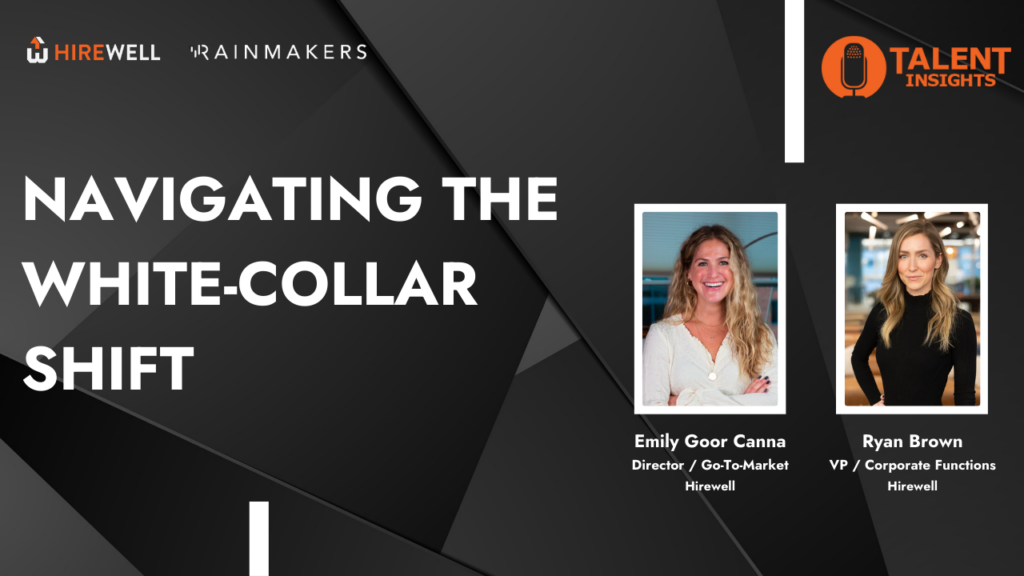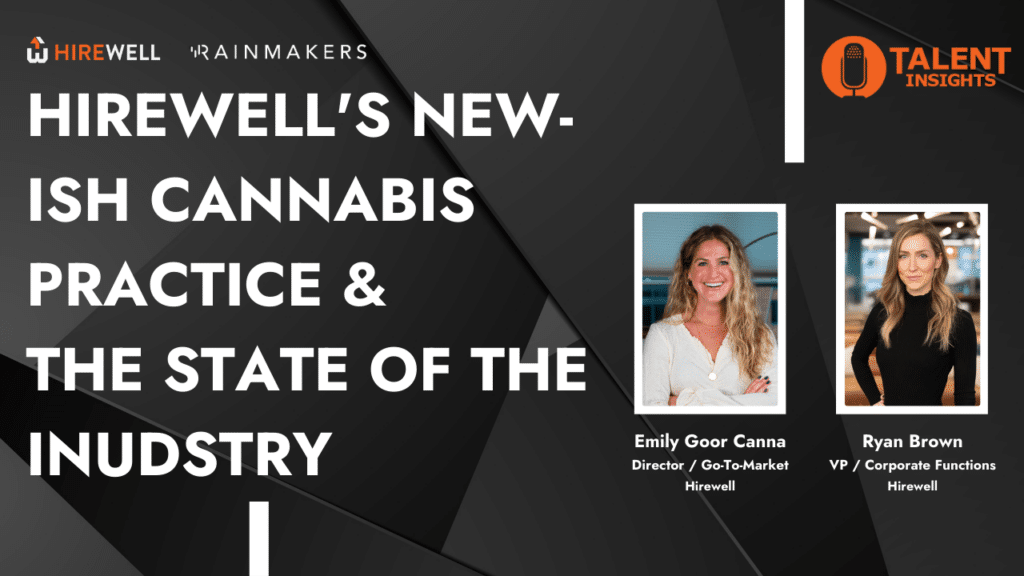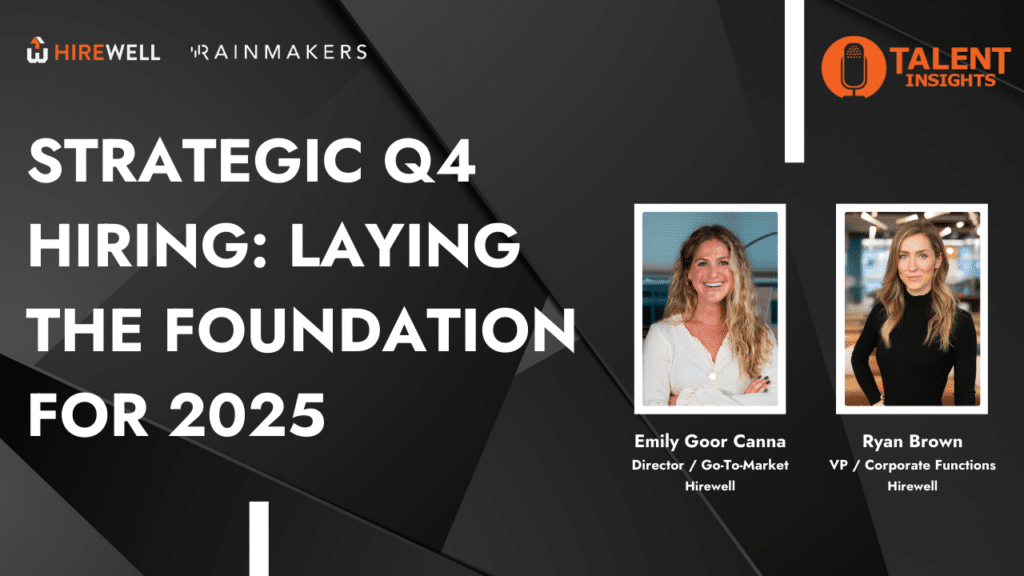In this episode of the Hirewell Update, hosts Ryan Brown and Emily Goor discuss Gen Z’s impact on workplace culture, focusing on work-life balance and mental health. They explore why Gen Z takes more sick days, including mental health days, and contrast their attitudes with older generations. The role of remote work in this shift is examined, and they conclude by emphasizing the need for organizations to adapt. Tune in to learn more!
Episode Transcript
Happy Wednesday to everyone tuning in to today’s episode of the higher wall update. I’m your host, Ryan Brown, vice president of our corporate functions team. And this is my co host I’m Emily Goor, director of our go to market recruiting team. The Hirewell Update covers the latest talent insights, monthly placement, overviews, talent solutions, and the hottest jobs we’re working on all brought to you by us, your market experts here at Hirewell.
Before we kick off the show, you can find all of our content at talentinsights.hirewell.com, or if you’d like to learn more about Hirewell or service offerings, check out our website, www.hirewell.com. We’ve got some really hot talent insights today that we’re excited to chat about. And the topic for today’s show is the wellness shift.
So Gen Z, the future of work, what the Gen Zers are doing to the workplace. So I really want to dive into this topic today because it’s become more and more relevant. I think in the modern workplace, Gen Z and their approach to work life balance, to mental health and why they’re taking more sick days then previous generations.
Okay. You know, I’m excited. Yeah. About this topic. That is true. I think it touches on something we’re seeing more and more in the workplace and something I personally value, like when you were talking about wellness, I was like, well I have been the self-proclaimed higher wellness chair person for years, years and years.
Yes. So something I definitely value, but I think a lot of workplaces like need to be maybe better at putting value on wellness. I know Gen Z is kind of changing the conversation around mental health and boundaries. I think it’s really fascinating.
But I do think it’s really, really fascinating how Gen Z is just changing the conversation around all of this. For sure. I mean, Gen Z has been vocal about how their generation is handling work differently. And it’s a few things like we mentioned at the beginning of the show, just whether it’s taking mental health days or setting firmer boundaries, or just even having a completely different approach to what a work day should look like.
Yeah. I’m curious. You mentioned, taking more sick days at the beginning. Like, why do you think Gen Z is taking more sick days? Then older generations, I guess, then our generation and
Are we part of the older generation? I think yeah, we are. That’s true. That is true. Yeah. You and I can like, we can try.
I don’t know. I was like, is this Gen Z? We are older. We are older. Okay, well, that’s true. But I do think part of it is just their recognition that sick days aren’t just for physical illnesses anymore. So in the past, I mean, think about, you probably have done this. I’ve definitely done this where you’d really only take a sick day if you had like the flu or you were really sick and couldn’t go into the office or go into work.
But even like, sorry, there were days where we like still did, gross like pre COVID days, you’d be like. Hacking up a lung in the office. Yeah. And we’d still be in there for sure. But I think now, you know, mental health is just equally as important, especially for Gen Z and that generation.
So if people are feeling burnt out or stressed or even dealing with anxiety, it’s really impacting productivity and wellbeing. Yeah, just as much as a physical illness. What? So having the flu versus, feeling burnt out. People are viewing those things really similar. So it makes sense that Gen Zers are more comfortable taking time off for that because that’s how they’re approaching and viewing, these things.
I think it’s such a good point. I think, the older generations, us included. Like I just said, we were raised to kind of push through it both, but both mentally and physically, honestly. Right. Like we just said there were days where I was like, Oh, like I’m feeling under the weather, but I’m not like sick enough to stay home.
Like even when I am feeling like burnt out, I feel like we are raised to just kind of push through it and you know, things of that nature. Do you think, I don’t know. Do you think Gen Z’s approach is. Kind of more about self awareness. Definitely. I’m, yeah, I mean definitely. I think a lot of us grew up seeing our parents or older siblings
work until they were totally burnt out. And as millennials, we can probably fall into both of those categories. Seeing our parents do it, we’ve probably done it, our older siblings, whatever it may be, our parents, and maybe even us, haven’t always had the language to talk about mental health.
And even if they did, there just wasn’t really the same understanding level of acceptance with regards to it. So now mental health is discussed openly. There’s definitely less of a stigma. So I think more and more we’re recognizing it’s okay to ask for help or even just to say Hey, I need a mental health day.
Like i’m taking the day off Can I practice that? Yeah. I need a day. Approved. it’s so funny. Like it’s, that didn’t honestly come like super naturally to me. So I don’t know, I find it like really, really interesting because it feels like Gen Z is almost like rewriting the script a little bit on work life balance.
I know. It’s like they’re setting boundaries that maybe older generations didn’t even think about. Like I said, I almost feel like I have to practice that in the mirror. Like I need a day, like I need to take the day for myself it doesn’t come super naturally. Do you feel like it’s something you’ve consciously done in your career? not until recently. No, I think the same as you, I’m where you were just practicing and kind of feeling uncomfortable asking for that day. I definitely fell into that bucket too, but I think what I envy a lot about the Gen Z professionals is that they’re not afraid to set boundaries with their employers. And frankly, like I really admire that too. I think that’s pretty incredible to have that type of boundary setting capability. And it’s not that they don’t want to work hard and succeed, but they definitely do just not at the expense of their health and
like outside of work. So the value of downtime is huge, and the separation is also between work and life and all of that balance is really important for mental health. So I think employers are slowly starting to understand that if they want employees to be their best, that they need to respect those boundaries and.
Any one of my team members, that reports into me is watching this show. This is probably ringing really true for them because I harp all the time on, you need to take time off. You need to make sure you’re not getting burnt out. Please take a day. If you haven’t taken days off I’m like telling people that they need to exercise that, right.
But it is, I think, harder. To do it for yourself in some capabilities. ’cause like I said, I’m just now recently doing this. You’re still uncomfortable saying it. So something that we definitely have to work on. It’s funny you say that because I feel like I’m also saying that all the time to the people that report to me.
And I’m like, yeah, for sure, a hundred percent take the day. I can think of even recent conversations where people have been like, Oh, like I need to take a half day for- I’m like, just take the day, like take, the day. But why am I, why don’t I, right? Like I tell people that report to me, but why don’t I, I think it’s nice too, that you, you specifically said it’s not that they don’t want to work hard and succeed because I think sometimes, and we can probably be honest, like we’ve seen it, there gets to be kind of like a bad rep attached
to it. You don’t want to work hard. You’re it’s a lazy generation, et cetera. But I do think it’s important to kind of note that distinction of just because somebody setting boundaries doesn’t mean that they don’t want to work hard and succeed. I do think though, it’s just a huge shift from like the traditional hustle culture that has been glamorized for so long.
And like you said, that we’ve kind of been brought up in the workplace with, Do you feel like remote work has played a role in this too? I mean, absolutely. Yeah, absolutely. I think 2020, we always go back to 2020, but it was just such a huge and pivotal shift in what work looks like for many people and life too.
And that was really bringing remote work at the forefront. So remote work really has given people more flexibility, more control over our schedules, which has made it really a lot easier to maintain a healthy work life balance for some people, but there’s always a but, but at the same time it can blur the lines between work and personal life.
Em, you and I can probably relate to this really on a very deep level since we’ve been remote for almost five years now. But that’s why I think, you know, the boundary setting is so important. You have to make sure that you have a clear start, an end time for your workday and really try to stick to them as best you can.
’cause otherwise it’s really easy to feel like you’re always on and you’re never disconnected. I know, like I’ve pinged you way too late. You know what I mean? Like you said, I feel like, especially when we first started working remotely, I was like, there’s no distinction. Like you’re not. No.
You know, I used to remember, I’d get up from my desk at like. Five or six, whatever, when we were in the office, I’d catch the same train home or I’d catch the same bus home. I’d go to the same workout class after work. There was just more of a, like a natural forced boundary, right? Like a force was naturally in place versus now there’s times
where I’m like, Oh, well, I’m just going to do a little bit of work after dinner, like whatever it is, because it’s all just right here at my desk and all my things. I think that’s a great point that you make. And like thinking about those mental health days that you mentioned of like, I need a day, right?
Or just not even taking a day off because you’re physically sick, but like a mental health day. How do you feel like, maybe you have some advice, just like how to approach that with your employer? I mean, my take is being upfront and transparent. It’s always going to be key, especially as a people manager.
That’s what I value the most is when my team is just being honest, like, Hey, I’m feeling burnt out. I really need a mental health day, or I’m not having a great week. Do you mind if I take a mental health day? I don’t think you necessarily have to explain every detail either, but like let your manager know you need some time to take off, to recharge.
I think that’s totally fair. And most of the time, if they’re a good manager, they’re going to be supportive because they understand that employees will come back more focused, more productive because they’ve had that time off to recharge and do all the things that they need to do. But I think most importantly, it’s about normalizing these conversations in particular, and making sure that, you know, everyone is comfortable having them, whether you’re an employee
asking for the time, you’re a manager, you know, approving it. And it all comes down to like the culture of your organization and making sure that that’s acceptable. That it’s supported all of those things. Yeah. I mean, it sounds like there’s just been, like we were saying from the very beginning of this conversation, just a full cultural shift.
I mean, I think it’s awesome that Gen Z is pushing for these changes. I don’t thank Gen Z for everything, like I don’t thank them for getting rid of like high-rise jeans. I don’t thank you for that, but I don’t either. I still thank them for this. I think it’s awesome. They’re pushing for these changes.
You’re onto something this time. But I’m curious , do you think older generations, kind of like I was saying before, might perceive it a little bit too much as like Gen Z being like lazy or entitled? I know we touched on that a little bit briefly, but would love to get a little bit more into that.
Sure. Yeah, I definitely have heard that narrative and I think we all have, which is why you mentioned it previously. But in truth, I think it’s more of a misunderstanding than anything. It’s not about being lazy. Like let’s put a period at the end of that. It’s not about being lazy. It’s about prioritizing wellbeing so people can actually do their jobs better in the long run.
I mean, think about a time where you’ve been working extra hours. You’re really burnt out. Maybe you have some personal stuff going on too and the quality of your work versus the times when you felt really empowered and lots of energy and things are going really well, you’re getting enough sleep, like the balance is perfect.
It’s obvious to see where your performance comes in at a higher rate. So I think once people see the positive outcomes, like reduce burnout, like increased productivity and can actually have that data point to back it, then the perception starts to change. But there also has to be a willingness to allow for those opportunities to happen.
Yeah. I think that’s really important. It’s, it’s such a good point. Like, it’s not about doing less. It’s about working smarter, right? And a healthy, I mean, we’ve been saying for years, like work smarter, not harder, like it’s about working smarter and in just an overall, like healthier way, I think hopefully a lot of companies are beginning to see that now.
Do you feel though, like employees are adapting quickly enough to these changes, this like entire cultural shift? Some are, but I think there’s definitely still room for improvement. The companies that are more progressive in terms of workplace culture are definitely seeing the benefits of supporting their employees, mental health and respecting their boundaries.
Like no question there’s data to provide and support that others are slower to catch up, but it’s happening. And I think it’s currently, because Gen Z is so vocal about what they need and they’re willing to walk away from jobs that don’t align with those values. So there’s like a little umph behind it, you know, it’s not just a request.
This is a statement, these are the things that we need in order to be successful and to be great employees for your organization. So, you know, not necessarily a take it or leave it, but kind of a take it or leave it. It’s more of a come with us or leave it. Like, there’s a call to action that I think employers have to answer.
Yeah, it’s a great point. And, like, we’ve touched on that so much in our show throughout this year of, the different things that employees are valuing. Outside of just compensation and you know what I mean? I think a lot of that probably falls under the same umbrella. We’ve talked about work flexibility and you know, all that jazz I think falls under this.
And I think honestly, it’s like empowering to hear that you’re saying like Gen Z is vocal about it and they’re willing to walk away from the jobs if the values don’t align. Do you think the trend of prioritizing mental health and work life balance is going to keep going in that direction.
The more Gen Z workers enter the workforce. Cause I guess when you think about it, there’s a lot of Gen Z not yet in the workforce. Exactly. Yeah, I definitely do. And I think as more of those folks enter the workforce, it’s only going to get stronger. They’re going to continue to push for change.
I mean, mental health isn’t a trend. It’s a necessity. There’s. Science that supports that. There’s plenty of information that really emphasizes how important mental health is to us as just general humans and also us as employees. So I think it’s becoming more and more clear that a healthy, happy workforce is better for everyone, employees and employers alike.
And listen, the more Gen Zers that are entering the workforce, that means older generations are probably going to be, you know, Retiring or deciding on different futures for themselves in terms of what that looks like. So naturally the evolution of what the workforce looks like is going to change over time.
And frankly, I think this is one that I’m incredibly excited about. There’s plenty of folks, I think in that millennial type of bucket that are anxious for this. And, we’ve kind of burnt ourselves out for the first 10 to 15 years of our careers that I think we’re ready for this type of welcome change.
Yeah, I mean, I couldn’t agree more. I think this has been a really insightful conversation. I know, kind of like a different topic in a sense for us. I think it’s really refreshing to see how the next generation is helping redefine work culture for the better, and how organizations can adapt to support and empower their employees to build stronger workforces.
Like you said, like healthy, happy workforce is better for everyone. Exactly. Yeah. I love this. I could talk all day long about wellness in the workplace. This is a important topic. I think more people should. Yeah, me too Em. Well let’s make a pack right now. We’re both going to take a mental health day coming up someday soon.
Yep. We both need a day. We’re going to take one. We’re going to empower our team and our colleagues to take them to, maybe not all at the same, on the same day, though, maybe not on the same day. That may create some issues, but yeah, but no, I love, I love that you said that too, of like, okay, I’m going to take a day, but you’re right, we’re in a position now as people managers to have that trickle down to our team.
And I, I do think that’s almost, I don’t want to say more important than us taking a day, but. Equally important. You know, that we’re also creating, creating an environment where, the people around us are also feeling empowered to do so. Yep. Couldn’t agree more Em., I love it. Me too. That is a wrap though. That’s all we’ve got for you for this episode of the HireWell update. Thank you all so much for joining us. As a reminder, you can find all of our content at the newly beautifully updated talentinsights.hirewell.com. Or if you’d like to learn more about Hirewell and our service offerings, Check out our website. It’s www.hirewell.com and we’ll be back next week around noon central. We’ll see y’all then. Have a good one.

















